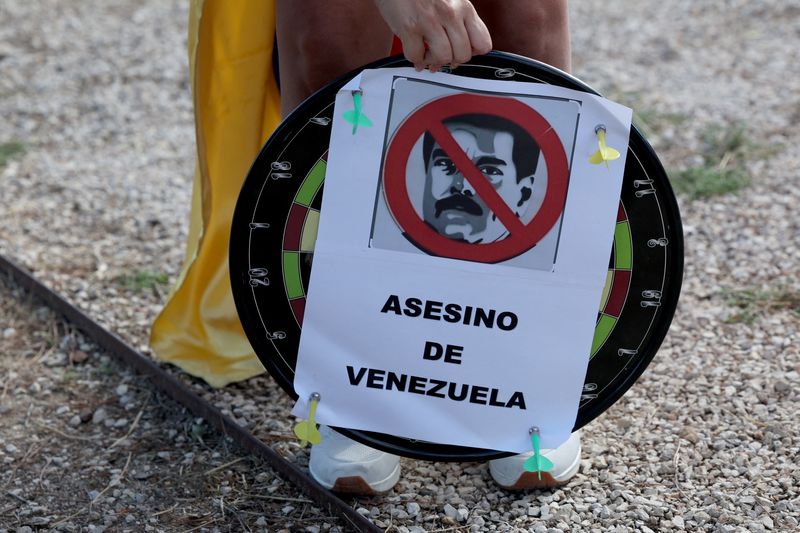By Vivian Sequera, Mayela Armas and Matt Spetalnick
CARACAS/WASHINGTON (Reuters) - The flight of former Venezuelan opposition presidential candidate Edmundo Gonzalez has largely extinguished hope for political change, voters say, as long-time President Nicolas Maduro shrugs off international criticism about the conduct of July's disputed election.
Election officials and Venezuela's top court say the July 28 vote was won by socialist Maduro, who has been in power since 2013. The opposition say tallies collected by its observers show a resounding victory for Gonzalez.
After being threatened with arrest, Gonzalez over the weekend fled Venezuela - and some other Venezuelans are already opting to do the same.
Those staying are largely giving up on any hope of a transition, as post-election protests have fizzled out and punitive measures from abroad have yet to materialize.
"I thought there could be a change, but now I don't know, it seems like we'll follow the footsteps of Cuba," said teacher Ender Lopez, 56, in the central Venezuelan city of Valencia. His two children have already emigrated.
"Some people have faith in international diplomacy, but now I don't think they'll do anything," Lopez added.
More than 7.7 million people have left Venezuela in recent years and more are setting out to join its robust global diaspora.
"I am looking for a better life," said migrant Alejandra Medina, who slept on the ground for two nights with her sons aged 4 and 2, in Pacaraima, a Brazilian border town.
In August, 12,325 Venezuelans arrived in Pacaraima, according to Brazil's Federal Police, up from 8,050 in June.
SHADOW GOVERNMENT
Former lawmaker and opposition leader Maria Corina Machado, who said last week she wants the international community to do "much more," on Monday urged countries to recognize Gonzalez as the president-elect, saying he would continue his fight for change from Spain, where he has claimed asylum.
But Venezuela has been here before. Former opposition leader Juan Guaido in 2019 created a parallel government - based on arguments that Maduro's 2018 reelection was illegitimate - an effort that was supported by many Western democracies.
The effort failed. Guaido eventually fled to the United States, the opposition called time on the shadow government, and diplomatic efforts shifted to parallel negotiations between the opposition and the government and the United States and the government.
Those talks led to a deal on election conditions signed in Barbados last October, the freeing of dozens of opposition-linked Venezuelans and 10 Americans, and the temporary drawdown of U.S. sanctions.
The detente was short-lived, foundering even before the election. The U.S. said in April it would reimpose the oil industry restrictions in response to Maduro's failure to meet election commitments.
U.S. officials have defended Washington's recent cautious response, insisting they are coordinating any future action with regional and international partners.
MIGRATION MISGIVINGS
But people familiar with the matter see Washington's options as limited and say Venezuela is competing for attention with foreign policy priorities like the Israel-Hamas conflict, Russia's war in Ukraine, and China's growing influence in the Indo-Pacific.
The Biden administration is finalizing a list of Venezuelan officials and their families who would face individual sanctions and U.S. visa bans, sources have said, but no official announcement has yet been made.
U.S. officials have privately expressed misgivings about actions that would inflict serious damage to an already struggling Venezuelan economy, fearing that could spur an increased flow of migrants to the U.S.-Mexico border. Migration is a hot-button issue in the tight U.S. presidential campaign.
Asked about criticism of the U.S. for acting too slowly and whether any action now might be too little, too late, a spokesperson for the White House National Security Council reiterated the administration's stance on Monday, saying the U.S. was "considering a range of options".
Talks with Maduro were unlikely until after the Nov. 5 U.S. election, said London investment bank BancTrust in a Monday note.
"If Maduro's downfall was imminent or if negotiations on a transition were ongoing, (Gonzalez) would not have left the country, in our view," it said.
For any discussions to happen there will need to be sufficient pressure from inside the Venezuelan government and the military, long a staunch backer of Maduro, said Venezuelan lawyer and international politics expert Mariano de Alba.
Among the diplomatic community, "there is fear that the tools of international pressure could end up having a negative impact," he said, adding that too much external pressure could further unite the government.
Brazil - whose president has traditionally had friendlier relations with Maduro - has sharpened its criticism in recent weeks.
Venezuela's government revoked Brazil's authorization to represent Argentine interests in the country, including administering the diplomatic residence where six opposition figures are sheltering, on Saturday, drawing Argentina's condemnation and Brazil's surprise.

A Brazilian diplomatic source said on Monday that Gonzalez leaving weakened the opposition's position.
"We understand why he needed to leave," the source added. "But it makes Maduro stronger."